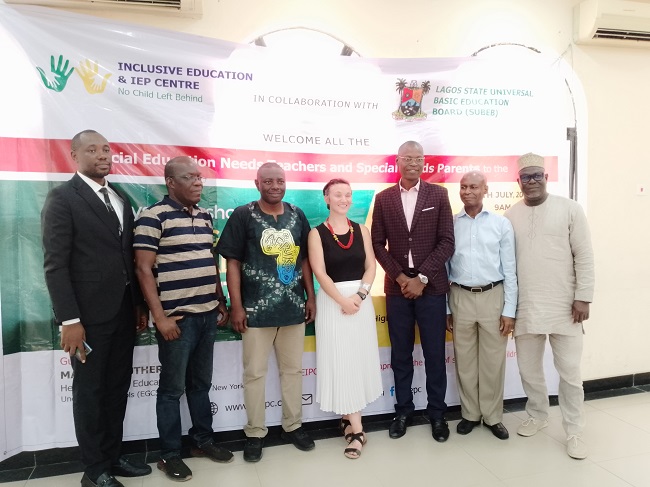The Inclusive Education and Individualised Education Plan Centre (IEIEPC) has trained teachers and parents on effective strategies and skills for teaching and caring for learners with special needs.
At the two-day training, which took place at SUBEB Hall, Maryland, Lagos, the Director, Inclusive Education and Individualised Education Plan Centre (IEIEPC), Dr Oyeyinka Oluwawumi, in his keynote address, said the training is aimed at equipping teachers and parents with skills to better maximise the potential of learners with special needs.
Oluwawumi, while calling for support from the government and good-spirited individuals within and outside the country, said the centre’s effort is born out of a passion for advocacy and a desire to help reduce the skills gap between educators and parents of learners with special needs.
He said, “Many a time, parents of children with disabilities are faced with difficulties of looking after their children alone, be it socially, economically or financially, hence they are mainly left with a huge burden and emotional trauma and sometimes there is a lack of adequate services/support or some services that are available are quite expensive for them to employ.
“This gap in knowledge always compelled me to at all times want to know if there was case conferencing on students with special needs and what assessment plans and follow-up data they are employing.
“If teachers don’t have guides or see good reasons to have modified curriculum for specially attending to students living with disabilities, how then do we give these children opportunities to fulfil their dreams and become successful.
“We have also seen the need to develop the capacity of regular teachers on basic special education and learning disabilities to enhance their teaching skills to be able to help regular children who are also facing these challenges. In line with this, IEIEPC strongly advocates that special educators should be in all our regular schools like we have guidance and counsellors.”
Guest speaker at the training and Head of Special Education, Uncommon Schools, New York, USA, Marissa Gutherz, said that lessons from the training will help parents and teachers of learners with special needs in motivating and supporting them in their learning.
She said, “When working with children with special needs, they need a lot of consistency and structure in order to be successful. Sometimes, the traditional school environment is not very helpful and can be very overwhelming because there are a lot of students and teachers and many things going on. So, teaching teachers how to have special schedules or special interventions to support the students helps their minds organise and helps decrease anxiety.
“Students with special needs are so because their brain functions in a different way, so, giving teachers these strategies helps them teach in a way that is different from the way to teach a normal child. That is why we talked a lot about schedules and tools that can be used that would be different from what would be used in a typical classroom.
“The first thing that teachers need to remember is to be very empathetic and patient. It can be very challenging working in education or working with any child at all but definitely being creative, being empathetic, motivating the child and also using hands-on materials can be very helpful.”
Dr Udeme Jacob, a lecturer with the Special Education Department, University of Ibadan, in his lecture on ‘Inclusion Revolution: Best Practices for Special Education,’ harped on the need for an inclusive learning environment for regular learners and learners with special needs.
Jacob said, “Inclusive education is not just for children with special needs; it is to also help develop empathy in regular learners and help parents of regular learners that these children are also human. It is also to ensure equality and social justice for persons with special needs.
“The government should try as much as possible to make the environment a conducive one, modify certain things like the sitting arrangement in the classrooms so that these learners can be accommodated. When they are provided with opportunities in the learning environment, they will contribute to society and be willing to lead independent lives.”
The Board Secretary, Lagos State Universal Basic Education Board, Lamidi Akeem, in his remark, appreciated the IEIEPC for organising the training and urged the participants to maximise the lessons from the training.
Some of the participants at the training, including Afolabi Oyebade, Chairman, Nigeria Association of Special Education Teachers, Lagos State chapter and Mrs Agnes Adeyemi, Head of Unit, Ooreofe Inclusive Unit, Lagos, said the training equipped them with beneficial strategies and skills which they will deploy in teaching their students.
Oyebade said, “There are new things that we have learnt today; a lot of strategies that have been learnt that we are going to put in place. I will also advise the teachers that are here that when they get back to their schools to step it down to their colleagues so that the children with special needs can benefit maximally from this. It will also make our work easier because of the new strategies that we have learnt.”
Adeyemi said, “I have learnt so many things which give me more knowledge on how to take care of the children very well, they proffered many solutions to our challenges. I will suggest that the government should provide a special curriculum for us so that we will not be using a regular curriculum.
“I have learnt how to assess the children whenever parents bring them to school. Before we admit them, we need to assess them in order to categorise them according to their challenges.”
Some of the topics explored during the training include Classroom Management for Children With Special Needs, Effective Teaching Strategies for Inclusive and Special Education, Parent-Teacher Collaboration and Supporting Special Needs Children.
READ ALSO FROM NIGERIAN TRIBUNE




